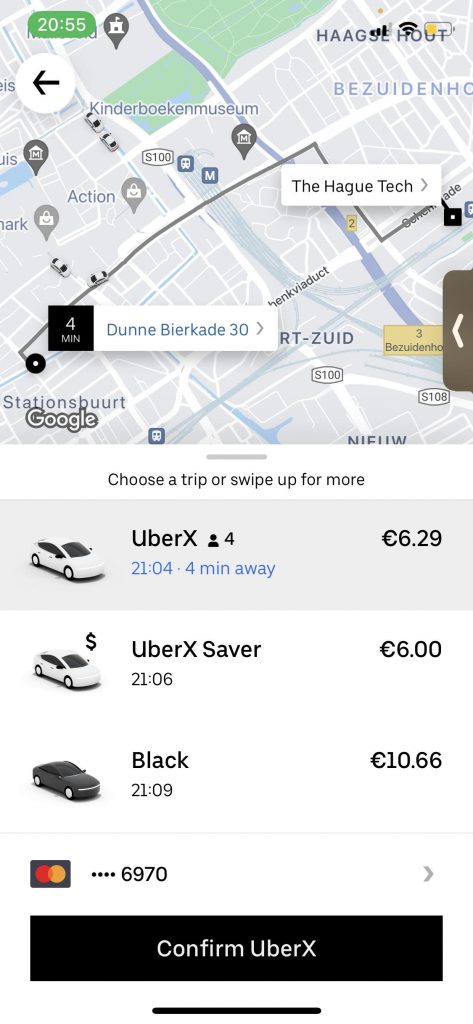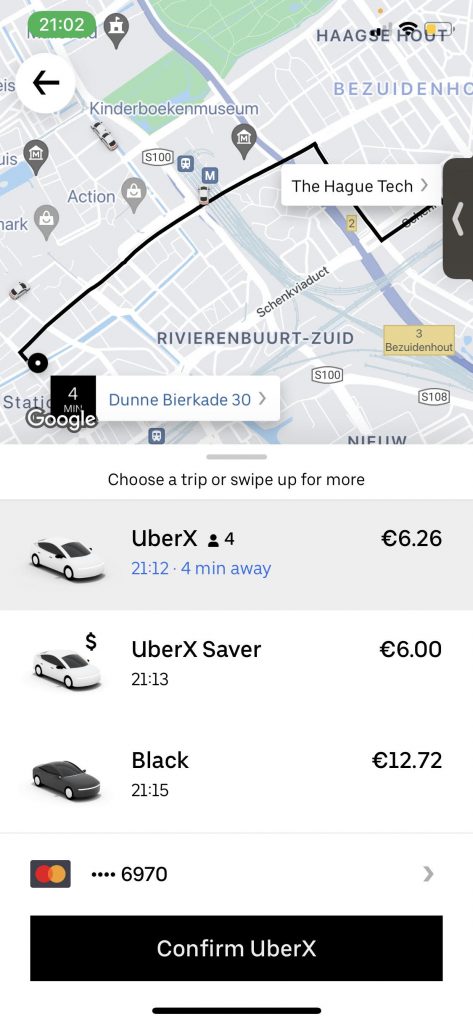Dinner, Dinner, chicken winner
A week ago, my boyfriend Gene and I were invited to a dinner at our friends Luciano and Mira’s place which is located somewhere in the deep suburbs of Den Haag. The initial excitement over spending an evening enjoying a home-cooked Italian meal was followed by a brief intermezzo of the realization that the journey to their apartment included undergoing an odyssey involving multiple means of public transportation. Idle as we were, we decided to simply indulge in the services of Uber – for the sake of saving time, as well as practicality regarding our avoiding the creeping onset of cold weather. Once we arrived, the dinner was as savory as always. The wine was flowing and the abundance of conversational topics didn’t seem to cease.
As the end of the evening was approaching, Luciano offered that Gene and I could stay over in order to avoid the hassle of relying on the punctuality of busses and trains to bring us back home. We politely declined, stating that we were going to call an Uber again. Immediately, Mira remarked, “Be careful, if the battery on your phone is below 20% or so, Uber will most likely charge you more for the route back home.” At first, we laughed and genuinely thought she was making a joke. “No,” Mira retorted in a serious tone, “I read a few articles which stated that the Uber app has access to your phone’s battery level and will arrange its prices accordingly.” As we still weren’t sure whether this was a silly joke (to be fair, at the time her remark seemed akin to yet another conspiracy theory one would come across in regards to big tech companies), we ignored it, entered the Uber we called and drove back home.
Food for thoughts
The following day, I couldn’t get Mira’s remarks out of my head. Consequently, I decided to search for articles which confirmed her statement. And lo and behold, there were a few to be found! However, most of them essentially accused Uber in the same aspects and conspiracy: suspicions regarding the dubious and incongruent changes in travel rates which have accumulated over the past few years. People online shared screenshots of their phones to wherein it was visible that they had checked the rates for an arbitrary route while their phone was charged and then repeated the process when their phone’s battery was almost dying (i.e. under 25 or 20%). Apparently, the charges differed immensely.
The first presumed reasoning behind these claims was that users were willing to accept whichever price was offered to them at the point of their requesting a ride due to a lack of offered choices at the moment when their battery was low. The objective to get home as quickly and safely as possible outweighed the financial detriment a pricey ride would cause to their finances.
A second reasoning affirming these claims was the fact that apps such as Uber have access to the battery level of any smartphone using their services, thus confirming the notion that if the apps CAN access that information, they most certainly WILL.
An investigation
Naturally, I decided to “conduct the experiment” myself together with three friends. I decided to check the rates of two routes: the first was from my home in The Hague to The Hague Tech Center, and the second one from my home to Hugo de Grootstraat in Leiden (my former residential address). During the experimentation, two of my friends were with me and the third one was located in Leiden – however, she also typed in the same addresses for the starting and end point of the route. The battery levels on all my friends’ phones were lower than mine and there was only a five minute difference between my checking the rates together with the first two friends and my checking again with my third friend.
The two friends who were with me had lower battery levels than I did. However, the prices for the same journey didn’t differ at all. Subsequently, I asked my friend from Leiden to follow suit. Peculiarly, in her case, her charges were lower than mine – albeit only for a few cents.
Altogether, the paramount jump in rates as stated in the news articles could not be proven by us. Naturally, one could assume that a variety of factors could have “sabotaged the research” or lead to only minimal changes in the prices compared to the drastic ones I read about online. Some of these factors may be that the demand for an Uber on a Tuesday night is not that high compared to a Friday night. Thus, the need for a competition which would spike up the prices is ruled out. Additionally, my friends and I compared our results at an early hour, namely around 9 PM. Perhaps the significant changes occur much later at night (or should I say, early in the morning).


Tales of Lies and Truths
Although it is true that Uber and similar transportational services have access to your phone’s battery, every Uber spokesperson vehemently disclaims that the app hijacks this information to distort the pricing rate. It all depends on supply and demand, so whether a vast amount of people in a particular area are simultaneously booking car rides with that area lacking a sufficient provision of cars. Consequently, the fares will rise to give drivers the incentive to relocate themselves and come near that busy area.
The Battery of Life
Nonetheless, Keith Chen who is the Head of Economic Research at Uber revealed in a podcast for NPR that battery life does qualify as a predictor of how willing a person is to acquiesce to price surges. This statement only goes to show how the contradictions are abundant. One of the questions this controversy brings forth is how detrimental to personal security it could be – not only in the technological sense of private information being handed over to a big corporation, but regarding real-life situations. Imagine walking back home in the late hours of the night, it’s dark, you are perhaps in a bit of a dodgy or remote area and the few people that walk past you seem threatening to you. When going out women, for example, face this sense of danger and precarious disposition very often, statistically speaking. To then know that you getting help by being able to get back home safely in a car entirely depends on whether you have enough money in your account and enough battery on your phone to “guarantee” you won’t be robbed of your last cents just for a ride back home, is a nightmarish thought indeed. Especially because I, if I were in that situation, would be more prone to walk home instead of spend the amount of money which could feed me for a week on a car ride, assuring myself that “everything will be fine and nothing bad will happen” – only for the situation to then turn sour.
Resources:
https://www.newsbytesapp.com/news/science/is-uber-linking-ride-pricing-to-battery-levels/story
https://metro.co.uk/2019/09/27/uber-charge-battery-lower-10778303/



Firstly, I must say how much I really enjoyed discussing this article in the seminar. It’s a welcome rarity to find a topic that is both practically informative and greatly intriguing. Perhaps this considerable intrigue stems from the disbelief that something like this is allowed to happen?! Yet, I feel that one factor which makes this topic so interesting is that, despite how problematic the issue is, it’s not a widely known matter. Considering the size as well as the numerous controversies attached to Uber, this concern is made greater still. The article made me consider how much of our data is available to private companies but also how they use the information available to them is totally up to them! Perhaps a daunting thought when we consider how regularly we read through the terms and conditions of creating accounts with Facebook, Uber, Twitter, Amazon or Spotify… I really respect the fact that you chose to conduct your own research for this as well.
Super interesting and well-written, Sascha! I enjoyed reading every bit of it. It is terrific how large corporations use our own data against us. In a way, it even makes me anxious about the future. Who knows what sort of consequences data collection will bring in a decade or so. The key is to stay conscious, and I guess…have a cellphone charged! 😛
I really enjoyed returning to and reading this! I remember discussing this in class, and just wanted to reiterate how crazy it seems to me that businesses get away with doing such things as these. Of course, there is no “official” way in proving that this is actually happening (at least not from our user side), but it’s still scary to think about how corporations benefit from basically endangering their customers…
hey Sascha, I really liked your blog post 🙂 I am already not a fan of Uber or any other driving services, because they are very very very expensive for poor students like us. And now, knowing that they charge you more, just because they can, makes me dislike them even more. It absolutely doesn’t make sense to my why you should ever pay more money if you have low battery on your phone, like… WHY? I pay for the same car, for the same driver, for the same way home… I really don’t get it. Of course for the company it makes sense, because why wouldn’t you make money if you can? It really annoys me hat they can do this, and it’s not even illegal right? But theoretically, I can also order an uber on my laptop or not? Can they see my battery then as well? I guess I’ll just stick to busses, trains and bikes…
This is super interesting! I have never thought that such an algorithm would exist. I already am aware of the algorithms of the websites of airline companies, where if you check out the same page multiple times, the price of the plane tickets goes up. But, this one is totally new for me. I can understand that, if you have a low battery, you want to get to your home quickly so instead of walking, you will choose to call an Uber. Would I do so? I definitely would. But I feel like this is a very detailed way of earning profits for Uber, a gigantic company that is already making a ton of profits. Your article is a very good point of discussion! I don’t think I would realize such a raise in prices anytime soon if it wasn’t from this post.